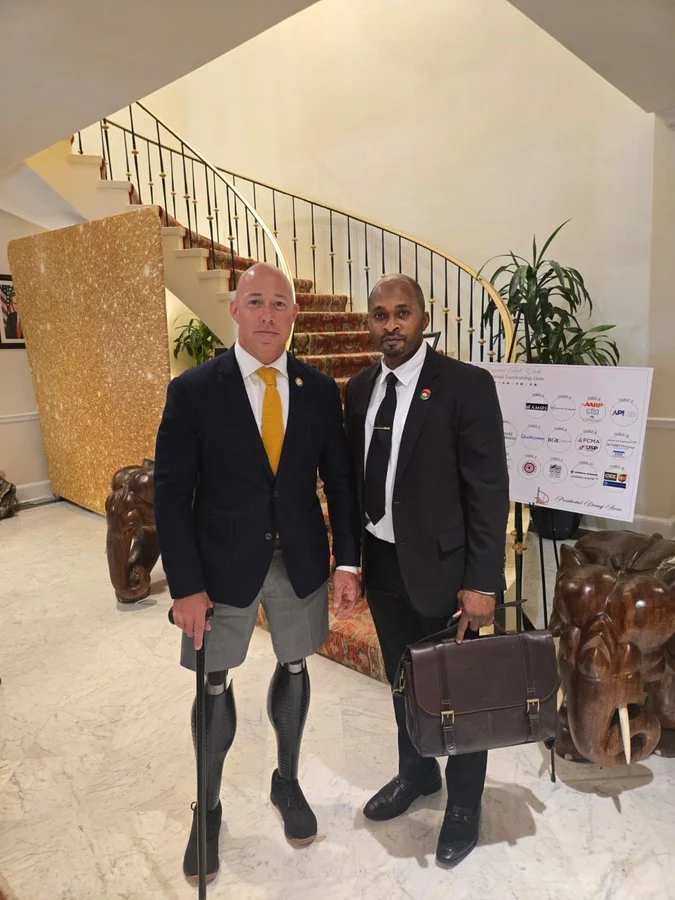A Diplomatic Gambit in the Shadows: Biafra's Outreach to Washington and the Echoes of Unresolved History
Biafra Republic Government in Exile Acting Prime Minister (APM) Ogechukwu Nkere with Congressman Brian Mast (R-FL)
Written by Nnamdi Iheukwumere
In the labyrinth of international diplomacy, where self-proclaimed governments in exile often operate on the fringes, a recent meeting has sparked intrigue. On September 3, 2025, Ogechukwu Nkere, Acting Prime Minister of the Biafra Republic Government in Exile (BRGIE), reportedly sat down with U.S. Congressman Brian Mast (R-FL), Chairman of the House Foreign Affairs Committee, to discuss "mutual interests" between the aspiring Biafran state and the United States. The agenda included a briefing on Biafran grievances, proposals for U.S.-Biafra agreements, and pointed concerns over potential American arms sales to Nigeria—sales that Mast, in his influential role, could help speak against. Nkere expressed gratitude for the encounter, framing it as a step toward recognition and partnership.
The Biafran movement, has long simmered as a symbol of self-determination amid perceived marginalization in Nigeria. BRGIE and the Indigenous People of Biafra continue to advocate for independence, citing ongoing human rights abuses, economic disparities, and political exclusion in Nigeria's southeast. This meeting could signal a savvy escalation in BRGIE's lobbying strategy—targeting a key congressional figure with oversight on foreign arms deals at a time when U.S.-Nigeria relations are strained by security challenges like Boko Haram insurgency and banditry. By voicing opposition to arms sales, Nkere taps into a vein of American foreign policy debate: Should the U.S. bolster Nigeria's military capabilities, it could potentially be enabling crackdowns and suppression of the fundamental human rights of Biafrans. Nkere hopes that the US will mount pressure on Abuja on democratic reforms?
Mast, a combat veteran known for his hawkish stances on issues like Israel and counterterrorism. His recent social media activity focuses on domestic priorities such as veterans' affairs, environmental policy in Florida, and commemorations like 9/11.
There's merit in listening: Reports of Nigerian security forces' heavy-handed tactics against IPOB, including extrajudicial killings and arbitrary detentions, have drawn international condemnation. This meeting might reflect growing congressional wariness about unchecked arms exports, echoing past blocks on sales to countries with poor human rights records. Proponents of Biafran independence argue that self-determination is a universal right, substantiated by historical precedents like South Sudan's secession.
This episode underscores a perennial tension in global affairs: the clash between state integrity and the right to self-rule. Nigeria's government, under President Bola Tinubu, has shown little appetite for dialogue, labeling Biafran activists as insurgents and cracking down on protests. Meanwhile, BRGIE's exile-based operations, including figures like APM Nkere, demonstrate resilience but also highlight the movement's isolation—reliant more on diaspora funding and symbolic gestures than territorial control. For the U.S., involvement could be a double-edged sword: Championing human rights might burnish its image as a defender of democracy, but it risks alienating a strategic partner in Africa's economic powerhouse.
Biafran advocates should prioritize international legal avenues, such as petitions to the UN. Washington, for its part, must weigh ethical imperatives against geopolitical realities. As the world watches Nigeria's fragile federation, one thing is clear: The ghosts of Biafra's past war demand resolution, not repetition. Perhaps it's time for a genuine mediated talk—lest history's cycle of violence spins anew.


